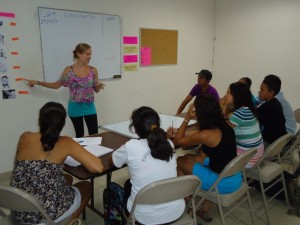Costa Rica Teaching News – It is easy to confuse want with need. Anyone who has taken even the most basic of introductory business classes would have been taught Maslow’s hierarchy of needs to help shed light on the important distinction. Maslow defines needs, of course, as those things such as water and shelter that are necessitated for one’s survival in life. Wants, in turn, are defined as mere luxuries. If Maslow had designed a similar ESL hierarchy, need would have, again, heavily outweighed the want.
 In previous columns I have disputed common misconceptions about teaching English in Costa Rica. This is another big one. There is a common conjured image of an ESL classroom that has twenty innocent children smiling and laughing with their teacher while having the time of their life. It’s a really nice picture. What it isn’t, though, is an accurate representation of what most ESL classrooms look like.
In previous columns I have disputed common misconceptions about teaching English in Costa Rica. This is another big one. There is a common conjured image of an ESL classroom that has twenty innocent children smiling and laughing with their teacher while having the time of their life. It’s a really nice picture. What it isn’t, though, is an accurate representation of what most ESL classrooms look like.
This is certainly not to say that a realistic portrayal is found in the opposite projection, either. But when discussing classroom environment in Costa Rica, contextual perspective is a must.
As I’ve written in previous columns, the most common ESL teaching job in Costa Rica is teaching corporate English to adults. In a perfect world a teacher would find a room full of students eager to eat up his or her every word and make the most of the opportunity in front of them. This, though, is hardly ever the case. And if it is, it may not be for the reasons that you would think.
In the corporate ESL world students are placed into an English classroom with one goal in mind: to improve their language skills to be more successful at work. I use the phrase “are placed” because often times this is literally the case. While it is common that students don’t have to pay for the language classes (or at least pay more than a minimal course percentage) it is also common that them taking the class is non-optional. With the many fortune 500 companies from the U.S and Europe that are now present in Costa Rica, speaking English, especially at the echelon of manager, at a higher than proficient level is becoming more and more a basic expectation.
Companies are willing to invest in their employees through language classes so long as their return is an improved work output. In many cases ESL student lists are created by managers and superiors based on who they need to speak better and not on which of their employees actually have the desire to speak better.
This leads to a mixed bag of students for an ESL instructor to deal with.
In every class there are at least three types of students. The student who can’t believe their company is paying for English classes and is going to take advantage of the opportunity presented for both professional and personal gain. The second type is the student who loves the class because it is during work time and he or she can use it as an excuse to not work for a few hours. The third type of student is the teacher’s nightmare. This student hates everything about the class. They hate that they are being forced to take the class. They hate that they are being obligated to learn a language they do not like. And they hate that they are being forced to learn a language just to be able to speak with clients and colleagues from The United States because people there refuse to speak a language other than English.
If you start working for a company that solely does what are deemed ‘public classes’ – those where students voluntarily enroll with their own money – this will not be an issue to the extent described above. Although you will surely still find one disgruntled student who knows he needs to improve his English skills for work but loathes having to take the classes. For the majority of ESL instructors in Costa Rica however, the sensitive corporate environment is where you’ll earn your bread.
Teaching English is not without its challenges. If this space is worth anything, it can be taken as expectation management. Just like your future students, to be successful in this field it’s essential to consider the needs in the classroom and not the wants.
If you want more information about teaching English in Costa Rica or getting your TEFL or TESOL certificate in Costa Rica feel free to contact Andrew at the Global TESOL College or email andrew@globaltesolcostarica.com
Originally from Toronto, Canada, Woodbury is the academic director of Global TESOL College Costa Rica , a contributor to radio program This Week in Costa Rica (http://thisweekincostarica.com/), and an independent writer based in Costa Rica.

